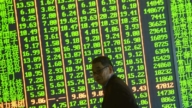【新唐人2014年02月06日訊】隨著中國金融系統的外匯借貸不斷加大,經濟學者們擔心,中國銀行間的問題,會引發全球金融危機。那麼,中國金融危機受害最大的將會是誰﹖請看專家分析。
1月剛剛離職的「惠譽」債信評級公司資深分析師朱夏蓮,日前向英國《電訊報》宣告,中國已經開啟了一個史無前例的信貸擴張,遠遠超過6年前震撼西方市場的金融危機,她說,中國銀行的崩潰不是機會很小,而是必然的。
被稱為「中國影子銀行問題專家」的朱夏蓮,出生和成長於美國,畢業於「耶魯大學」。早在2009年,朱夏蓮就警告,在西方金融危機發生之後,中國影子銀行系統助長了信貸擴張。隨著最近幾週「中國工商銀行」試圖對其銷售的信託產品撇清違約責任,朱夏蓮的警告顯得更加具有份量。
在過去五年內,中共銀行業已經貸出了14萬億到15萬億美元。而一月下旬,「中誠信託」的「 誠至金開1號」信託產品違約,造成30億規模的兌付危機。
國際清算銀行去年10月發佈的數字顯示,截至去年3月,中國的外匯貸款以及中國公司的跨境借款,已經達到8,800億美元,比2009年上升了2,700億美元。
朱夏蓮說,快速的外匯借貸擴張,代表中國金融系統的危機,會給國際銀行帶來更大的風險。
大陸金融分析師任中道:「它對國內的影響確實是大於國外的,首先錢荒將成為今年的常態,中共不斷的濫發貨幣,通貨膨脹非常的嚴重,老百姓生活成本增加,房租已經連續漲了20個月了,企業要承擔更高的利率。」
美國南卡羅萊納大學艾肯商學院教授 謝田:「這些風險主要還是在中國自己,直接影響到中國地方債,通貨膨脹、還有房地產的泡沫和股市的泡沫,信貸、錢荒的危機,肯定會在中國造成巨大的金融震盪。」
美國「南卡羅萊納大學艾肯商學院」教授謝田指出,中國金融體系的崩潰對國外的影響,主要體現在國外駐華企業,而對於中國企業,中共可以動用3萬多億美元的外匯儲備,來償還國營企業的外匯借貸。
據《上海證券報》報導,1月份的前20天,四大銀行新增貸款達4400億,存款則負增長超過7000億,預計1月新增貸款將超過去年的1萬700億,達到1萬1000億。
而1月29號,「交通銀行金融研究中心」發佈報告說,「交通銀行」預計1月份新增貸款為1萬1500億元人民幣。
不過一些小企業還是很難獲得銀行貸款。湖南一傢俬人企業合夥人說,去年,他的公司一直想貸款購買一個煤礦,可一直貸不到款,最終還是通過香港拿到了8,000萬港元(合1,030萬美元)的貸款。
另外, 2008年全球金融海嘯時,中共投入的4萬億刺激經濟計劃產生的經濟泡沫,目前如同把可樂急速倒入杯中,日益顯露出來。
任中道:「比如有目共睹的房地產的泡沫,還有金融體系,影子銀行總體規模超過30萬億,相當於GDP的一半,甚麼意思呢,就是所有老百姓創造財富,大概超過一半可能是泡沫的情況。」
中國的影子銀行和正規銀行猶如孿生兄弟,其中兩大陣地—–信託和理財產品,危機頻頻爆發。任中道指出,「中誠信託」30億規模的兌付危機出現,表明泡沫已經開始破裂。而今年還有超過5萬億規模的信託需要兌付,將會直接影響到正規銀行,而影子銀行、房地產和地方債,也會像放砲竹似的,連連崩潰。
中國《證券時報》分析表示,美元的持續升值,會導致中國資產市場被迫滑落,外匯儲備增加規模的自主權也會很小,利率政策也很難運用。分析人士指出,中國金融體系會因為美元的升值而變得更加脆弱。
同時,《電訊報》引述「瑞士聯合銀行集團」資深經濟師麥戈納斯(George Magnus)的觀點認為,中國銀行系統類似於80年代金融崩潰之前的日本。
採訪編輯/劉惠 後製/鐘元
Chinese Currency Crisis Could Lead to Permanent Money Shortage
With the rapid expansion of foreign-currency borrowing,
economists worry China’s banking system could lead to a
bigger risk for international banks.
Who are the victims of China’s economic crisis?
The following is our experts’ analysis.
Charlene Chu, a former senior analyst at Fitch in Beijing told
The Telegraph that, China has embarked on an unprecedented
experiment in credit expansion that far exceeds anything seen
before the financial crisis that rocked Western markets
six years ago.
She remains adamant that a Chinese banking collapse of some
description remains not just an outside chance, but a certainty.
Born and raised in America and a graduate of Yale, Ms Chu
has been warning since 2009 about the growth of a shadow
banking system in China that has helped fuel the credit expansion
seen in the country in the wake of the Western financial crisis,
reported The Telegraph.
The recent news of the Industrial and Commercial Bank of
China (ICBC) near default on the trust product has made
Ms. Chu’s warning even more meaningful.
In the past five years, Chinese banks have created lending
close to $15 trillion. A 3 billion-yuan ($490 million) investment
product, Credit Equals Gold No.1, a wealth management product
sold by the ICBC might default on January 31,
when it was due to mature.
Figures published by the Bank for International Settlements
(BIS) in October showed foreign currency loans booked in
China, as well as cross-border borrowing by Chinese companies,
had reached $880bn (£535bn) as of March 2013, from $270bn
in 2009, reported The Telegraph.
Charlene Chu told The Telegraph, “The rapid expansion of
foreign-currency borrowing meant a crisis in China’s financial
system was becoming a bigger risk for international banks."
Ren Zhongdao, financial analyst: “The impact on domestic
Chinese is greater than on foreign countries.
Money shortage has become a norm this year.
The abuse in cash printing has created severe inflation.
The cost of living has increased, rents have gone up for 20
consecutive months,
and industries are bearing higher interest rates."
Xie Tian, School of Business Professor, University of South
Carolina Aiken: “The risks are mainly to the Chinese.
It directly affects local government debt, increases the risks of
inflation, real estate bubble, stock market bubble, loans,
money shortage, and huge financial crisis in China."
Professor Xie Tian points out that the impact of Chinese
banking collapse to foreign countries will be mainly on foreign
enterprises in China, because for the Chinese enterprises,
the Communist regime has over $3 trillion foreign exchange
reserves to repay foreign currency loans for the state-owned
enterprises.
According to the ShangHai Securities News, China’s four
major banks total new loans have reached 440 billion yuan for
the first 20 days of January, negative deposits growth of over
700 billion.
The total new loans in January are expected to reach 1.1 trillion,
exceeding last year’s 1.07 trillion yuan.
Bank of Communications issued a report on January 29, an
expected new loans for January of 1.15 trillion yuan.
But some small businesses are still experiencing difficulty
in obtaining bank loans. According to a Hunan businessman,
his company could not get a loan to buy a coal mine until
finally a loan of $10.3 million was obtained through Hong Kong.
In addition, China’s 4 trillion economic stimulus plan in 2008
during the global financial crisis has started to see economic
bubbles like rapidly poured soda.
Ren Zhongdao: “For example, the real estate bubble is very
obvious. The financial system such as the shadow banking has
accumulated more than 30 trillion of wealth, equivalent to
half of GDP.
What does it mean? That means half of the wealth created by
the people are bubbles."
The official banking system and the shadow banking are like
twins in China. Troubles around the trust and wealth
management products of the banking system have frequently
erupted.
Ren Zhongdao indicates the 3 billion-yuan default crisis of
ICBC trust products suggests the bubbles have started to burst.
More than 5 trillion yuan of trust is yet to mature this year.
The official banking system will be affected, and shadow
banking, real estate, local debts will collapse like domino effect.
China’s Securities Times analyzed the continued appreciation
of the dollar will force the fall of Chinese asset markets,
little autonomy in increasing foreign exchange reserves,
and hard to control interest rate policy.
Analysts pointed out the vulnerability of the Chinese financial
system to a rising dollar.
“George Magnus, senior independent economist at UBS, said
the Chinese banking system resembled that of Japan during
the 1980s in the years leading up to the country’s financial crash",
said the Telegraph.
Interview & Edit/LiuHui Post-Production/ZhongYuan




























